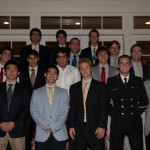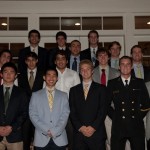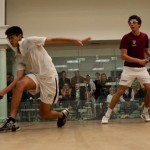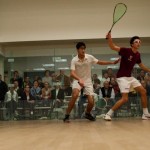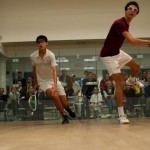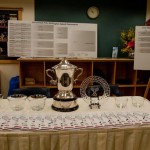Guest writer Ted Price is the tournament director of the annual Price-Bullington Invitational Squash Tournament, which was held October 28th – 30th. Photographs courtesy of Mary C.H. Johnson.
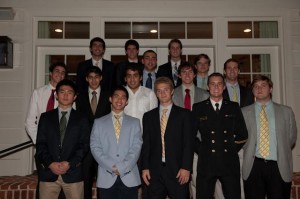
Richmond, VA — The 41st Price-Bullington Invitational was held on a perfect squash weekend –- cold and rainy – at the Country Club of Virginia in Richmond, VA. For the first time in the tournament’s long and robust history, the top two seeds were a sophomore and a freshman! The top seed was Egyptian Ali Faraq, a sophomore at Harvard, while the second seed was the newly minted freshman from Columbia via India, Ramit Tandon. These two players easily dominated play.
Seeded third and four were All-Americans Chris Hanson of Dartmouth and Gabe de Melo of Franklin & Marshall, correctly seeded in terms of their accomplishments last year, but both of whom were to lose to strong but unseeded players. The remaining players were relatively even in playing ability: Andres Duany and Adam Perkiomaki of Rochester; Kenny Chan, Robby Berner, and Ryan Dowd of Yale; Thomas Mattsson of Penn; Gui de Melo of F&M; Nigel Koh of Harvard; Reinhold Hergeth of Trinity; Islam el Fiki of George Washington; Hunter Bouchard of the Naval Academy; and the winner of the P-BI Qualifying Tournament, Francis Johnson, Yale ’09. On paper this was one of the strongest fields in recent P-BI history.
The first matches went according to Hoyle. Faraq defeated Johnson, the Qualifying Tournament Champion, although Johnson may have had the best match with the young Egyptian for at least the first two games, losing 11-6, 12-10, 11-2. Ramit Tandon rolled over Hunter Bouchard fairly easily 11-4, 11-6, 11-4. The first two seeds would not lose a game until the semi-finals when Tandon gave up one to Duany.
Continuing the first round matches, Gabe de Melo won in five long games over Berner, Chris Hanson won in five over Hergeth; Adam Perkiomaki defeated El Fiki in four; Kenny Chan edged out Mattsson in five; Duany beat Koh in three; and Gui de Melo beat Dowd in three.
With the advent of the second round, the action heated up. Faraq easily over came Perkiomaki in three (11-6, 11-4, 11-8), and Tandon did the same to the younger de Melo (11-6, 13-11, 11-6).
Third seed Chris Hanson ran into a surprise buzz saw in his match with a very patient and aggressive Andres Duany. Duany came on strong from the start, startling Hanson with an 11-5 first game victory. The junior from Rochester used his height to his advantage, retrieving well and simply keeping the ball in play. Hanson recovered his rhythm quickly, taking the second and third games 11-3, 13-11, but this cost the Dartmouth player dearly as Duany increased the pressure in the fourth game, never letting Hanson get comfortable. Game to Duany 11-6. The last game showed Hanson exhausted, hitting off balance and unable to retrieve Duany’s deep rails and nicks. The final game went to Duany, 11-2.
Gabe de Melo had much the same experience as Hanson did with Duany against Chan. This was a game of Mutt and Jeff. Chan, shorter than de Melo by almost a foot, raced around the court unwilling to let de Melo use his reach put the ball out of Chan’s reach. After Chan won the first game 11-3, de Melo came roaring back to win the next two games 10-12, 11-8. Again the effort of winning these games was too much for de Melo and Chan easily closed the match out 11-5, 11-1.
On Sunday the spectators were ready for superb squash and they were not disappointed. While it seemed very likely that both Faraq and Tandon would win their semi-final matches, no one had a clue if these matches would be easy or hard. As it turned out, Faraq dominated while Tandon had to figure how not to spend too much physical capital battling with a very agile opponent.
At the top of the draw, Faraq came out for bear and seemed to inhibit Chan. Before one could blink the score was 6-2 for Faraq. Chan couldn’t find his rhythm. As was the case with all of his opponents, Faraq rattled all with his racquet control and change shot ups. He would vary shots from vicious cracks to feather soft with almost no discernable effort, moving the ball deceptively around the court. Chan couldn’t compensate despite his speed. First game to Faraq 11-5. Faraq returned to the court for the second game relaxed and ready to drag the points out again. While the score was closer at 11-8, Chan missed numerous opportunities, as weariness caused him to hit shots off balance. The final game found Faraq playing more confidently than ever, sliding from side to side, keeping the ball tight to the wall, maintaining control. Chan battled bravely but couldn’t win the crucial shots and Faraq won the last game 11-8.
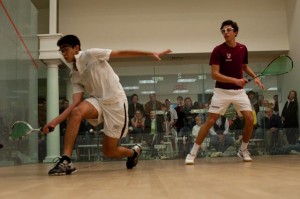
At the other end of the draw Tandon took on Duany. The junior from Rochester had impressed the spectators with his skill and persistence in his first two matches and in this game he showed the same shot control and grit. The first game was very physical with numerous lets on the first two points. It seemed that both players had similar games – impressive put-aways, just keeping the ball in play – and both were tall and lanky and seemed to get tangled at mid court easily. No spectacular shots, just long rallies. The game lasted over a half hour and Tandon won 11-8. The second game was the reverse of the first with Duany taking control, executing roll corners and nicks with ease. Tandon seemed to come unwound, over running the ball and making errors. Game two to Duany 11-8. The third and four games are very even and as neither player wanted to relinquish the “t.” The end came following a very long rally at 8-5 for Tandon. Duany kept the ball deep while Tandon anticipated drops. Time and again, the young player from India corrected, making extraordinary gets in the back court – his arm looked elongated, and he often lept over a stretched Duany to do so and in the end wore the latter down, taking the game 11-7
The final game was equally long at 11-9 with Tandon coming up with the victory. The length of this semi-final did not help the young Indian as his failure to end the match quicker – or maybe one should say as the skill of Duany in keeping Tandon from ending the games quicker – may have been a factor in his match against Faraq. Tangentially, one would expect to see great things from Rochester’s Duany this year judging from his performance on the court in the 2011 P-BI.
The final of the P-BI was a spectator’s dream. Both players would play similar games, having both been professionals in the recent past. Faraq had been ranked as high as 60th in the world at one point and Tandon as high as the low 100s. The crowd knew they would witness greatness on the court.
It was a fascinating match from many aspects. First, the noise, or lack thereof. Matches before the final had been relatively noisy, as players raced around the court, feet pounding and driving into the court. Tandon and Faraq did not seem to touch the floor, so light were they on their feet. There were swishing sounds rather than thumps. Then the skill level: racquet control was second to none. Both players could alter the flight of the ball at warp speed with a simple twist of the wrist. Not many players we have seen could have made these adjustments. Finally speed. As great as the shots were and as confusing as the reversals were, each player could readjust to the shots with lightening quickness, dancing to the ball and returning it.
It seemed likely that Faraq would win in the end and he did. But in his getting there, spectators had a treat. Faraq never relinquished the lead in the first game, building a 4-0 lead on a series of drops that defied belief before Tandon put two points on the board. At 9-5 for Faraq, Tandon was able to nick a drop for one point and then feather another roll corner that Faraq was unable to dig out. Then the Harvard sophomore closed out the game with one powerful and tight rail that Tandon couldn’t peel off the wall, following a gorgeous hold that left Tandon completely off balance. Game for Faraq 11-7.
In the second game, Faraq again built a solid lead 5-2 before Tandon came to his senses and dug in. Something happened to Faraq at this point as possibly he seemed to lose his concentration. Maybe it was because Tandon’s shots were just too good, or because the Egyptian was overconfident. Tandon, growing more confident with every shot, held then lobbed and lobbed again to leave Faraq unable to recover in time to retrieve the Indian’s perfect drops. 7-5 for Tandon. Faraq recovered to lace three vicious cross courts for one point and then wrong-footed Tandon for one point before Tandon came back with a series of rails and nicks to move up to 9-7. Faraq won one more point when Tandon missed a boast before Tandon closed the game at 11-8 on a Faraq tin and a poor return which allowed Tandon to drop a nick in the right front corner. Second game to Tandon.
The second game may have been Tandon’s Waterloo as he seemed a little slow on returning to the court for the third game. He had a very tough semi-final and then had just played two very hard fought games in the final against a very aggressive opponent. By the same token, Faraq looked as if he had been on a vacation. The third game was fairly even to 6 all and then Faraq turned up the heat. Tandon won two more points in the game, one on a gorgeous lob drop and the last at 10-7 when he held the ball perfectly three times, finally getting Faraq off balance to win onw more point. Tandon looked ragged at this point and Faraq tookadvantage of the situation to win 11-7 with a reverse corner off a loose serve.
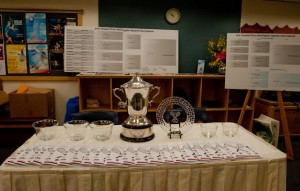
The final game was somewhat anticlimactic as Tandon had obviously burned his bridges in the first three. He was tough, though, not willing to give up points easily — but he did give them up. After winning the first point of the final game, Tandon didn’t get another until Faraq had garnered 8. He was to win two more points before Faraq became the 41st P-BI Champion on a driving cross court that Tandon couldn’t get his tired body to reach. Point, game, match and championship to Faraq, 11-3.
The First Round Consolation was won by Islam El Fiki over Ryan Dowd. The George Washington junior had improved all weekend as he shook off the rust and in the end took control of the final winning in a long well fought match over the Yale senior 11-9, (7-11), 11-7, 11-7 .
The Second Round Consolation championship was a match of All-Americans featuring Chris Hanson of Dartmouth and Franklin & Marshall’s Gabe de Melo. This was a particularly interesting match as Hanson had become ill after his final match on Saturday and was not expected to play in the semi, let along the final on Sunday morning. However, giving a good imitation of Lazarus, a rejuvenated Hanson showed up on time for his first match against Gabe de Melo’s younger brother, Gui, winning the match in five long games. Then he repeated this accomplishment against the elder de Melo with another five game victory 17-11, 11-7, 11-3, 9-11, 11-8 to take the 2nd Consol crown.


